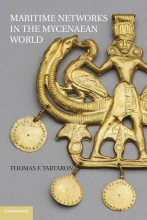Tartaron Wins Archaeological Book of the Year Award

Thomas Tartaron, associate professor of classical studies, has won the Archaeological Institute of America’s James R. Wiseman Book Award for best archaeological book of the year, for Maritime Networks in the Mycenaean World. The book takes a new look at maritime life among the Mycenaean Greeks from 1600 to 1100 B.C.
While the Greeks’ long-distance trade with Egypt and Cyprus has been substantially studied, local maritime networks have been largely ignored and the locations of Mycenaean harbors are virtually unknown. In his book, Tartaron provides concepts and methods for recovering lost harbors and short-range maritime networks, using information from ship construction, coastal paleoenvironments, oral histories, Homer and other ancient texts, archaeological fieldwork, and network theory.
In announcing the award, the Archaeological Institute of America (AIA) cited the book’s “offer of a new structure and method for integrating land and marine archaeology and history in a stimulating and accessible way.” Tartaron was presented with the award at the AIA annual meeting in San Francisco in early January.
Tartaron’s research interests include Greek Bronze Age archaeology, Classical archaeology, landscape archaeology, and ethnoarchaeology. He is currently working in three sites in Greece, as co-director of the Saronic Harbors Archaeological Research Project (SHARP), director of field survey for the Molyvoti, Thrace Archaeological Project, and principal investigator of the Molyvoti Oral Histories Project. He is also principal investigator of the Kerala Maritime Communities Project in India. Tartaron’s writing also includes Bronze Age Landscape and Society in Southern Epirus, Greece and dozens of articles, chapters, and papers.
With nearly 210,000 members, the Archaeological Institute of America is North America's oldest and largest organization devoted to the world of archaeology. The AIA promotes archaeological inquiry and public understanding of the material record of the human past to foster an appreciation of diverse cultures and our shared humanity.





